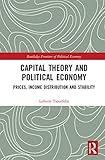Capital theory and political economy: prices, income distribution and stability
Material type: TextSeries: Routledge Frontiers of Political EconomyPublication details: Routledge London 2021Description: xi, 224 pISBN:
TextSeries: Routledge Frontiers of Political EconomyPublication details: Routledge London 2021Description: xi, 224 pISBN: - 9781032006253
- 339.21 TSO
| Item type | Current library | Collection | Call number | Copy number | Status | Date due | Barcode | |
|---|---|---|---|---|---|---|---|---|
 Book
Book
|
Indian Institute of Management LRC General Stacks | Public Policy & General Management | 339.21 TSO (Browse shelf(Opens below)) | 1 | Available | 007580 |
Browsing Indian Institute of Management LRC shelves, Shelving location: General Stacks, Collection: Public Policy & General Management Close shelf browser (Hides shelf browser)
In recent years, there have been a number of new developments in what came to be known as the "Capital Theory Debates". The debates took place mainly during the 1960s as a result of Piero Sraffa's critique of the neoclassical theory according to which the prices of factors of production directly depend on their relative scarcities. Sraffa showed that when income distribution changes, there are many complexities developed within the economic system impacting on prices in ways which are not possible to predict. These debates were revisited in the 1980s and again more recently, along with a parallel literature that has developed among neoclassical economists and has also looked at the impact of shocks on an economy.
This book summarizes the debates and issues around the theory of capital and brings to the fore the more recent developments. It also pinpoints the similarities and differences between the various approaches and critically evaluates them in light of available empirical evidence. The focus of the book is on the price trajectories induced by changes in income distribution and the resulting shape of the wage rates of profit curves and frontier. These issues are central to areas such as microeconomics, international trade, growth, technological change and macro stability analysis. Each chapter starts with the theoretical issues involved, followed by their formalization and subsequently with their operationalization. More specifically, the variables of the classical theory of value and distribution are rigorously defined and quantified using actual input–output data from a number of major economies, but mainly from the USA, over long stretches of time. The empirical results are not only consistent with the anticipations of the theory but also further inform and therefore strengthen its predictive content raising new significant questions.
(https://www.routledge.com/Capital-Theory-and-Political-Economy-Prices-Income-Distribution-and-Stability/Tsoulfidis/p/book/9781032006253?srsltid=AfmBOopMEG0Q6rTJTXCgo1islWK6q6gT1fa5OR7lSD_NcS9ubMW7pe9f)
There are no comments on this title.








